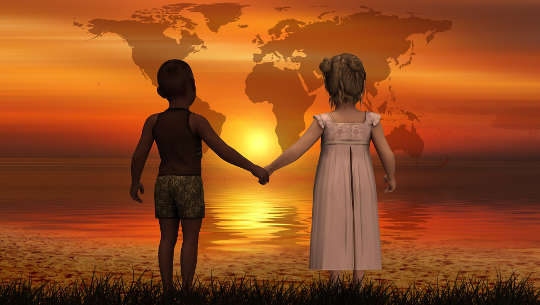
Image by Gerd Altmann
Teaching children to understand others’ perspectives could make it easier for them to learn how to forgive other people, according to a new study.
The findings also show that teaching children to make sincere apologies can help them receive forgiveness from others.
Why Forgiveness Is Important
“Forgiveness is important in children and adults for restoring relationships and limiting future conflicts,” says lead author Kelly Lynn Mulvey, an associate professor of psychology at North Carolina State University. “But we didn’t know much about what makes children more likely to forgive others, particularly from early childhood to adolescence. That’s what we wanted to explore with our study.”
To that end, Mulvey and her collaborators enlisted 185 children, between the ages of 5 and 14, in the study. Researchers conducted in an in-depth interview with each child that collected background information and assessed the child’s “theory of mind” skills.
Theory of mind is your ability to understand that someone else’s beliefs, intentions, and desires are different from your own.
Researchers then led each child through a series of scenarios involving other children who are “in group” and “out group.”
Specifically, each study participant was told they were part of a group, such as the green team. During interviews, researchers described some children in the scenarios as also being on the green team (making them in-group), while other children in the scenarios were on the yellow team (making them out-group). In each scenario, interviewers asked study participants whether they were willing to forgive a group that left them out of a game or activity.
There Were Three Main Findings
First, children are more likely to forgive someone if they have apologized. Second, children are more likely to forgive people who are “in group.” Third, the more advanced a child’s Theory of Mind skills are, the more likely they are to forgive others.
“We found that kids have sophisticated abilities to forgive others,” Mulvey says. “Children are capable of restoring relationships with others, and are usually interested in doing so.”
The researchers identified two things that parents and teachers may want to focus on related to forgiveness. One is helping kids understand how important it is to apologize in a meaningful way.
“Children are capable of discerning an insincere apology, and insincere apologies were not conducive to encouraging forgiveness,” Mulvey says. “The apology needs to make clear that someone understands why what they did was wrong. This, in turn, makes other kids more likely to give them a second chance.”
The second focus area is helping kids understand the perspectives of other people, even if they are different from you.
“One of the biggest implications of our study is that teachers and parents need to actively help children cultivate theory of mind skills,” Mulvey says.
“A good starting point is getting kids to explain the rationale behind their actions and how this might make other people feel. Helping young people develop these skills in childhood will aid them in navigating a diverse and complex world.”
The study appears in the Journal of Experimental Psychology: General. Additional coauthors are from the University of Adelaide and NC State.
Source: NC State, Original Study

Related Books:
Here are 5 non-fiction books on parenting that are currently Best Sellers on Amazon.com:The Whole-Brain Child: 12 Revolutionary Strategies to Nurture Your Child's Developing Mind
by Daniel J. Siegel and Tina Payne Bryson
This book provides practical strategies for parents to help their children develop emotional intelligence, self-regulation, and resilience using insights from neuroscience.
Click for more info or to order
No-Drama Discipline: The Whole-Brain Way to Calm the Chaos and Nurture Your Child's Developing Mind
by Daniel J. Siegel and Tina Payne Bryson
The authors of The Whole-Brain Child offer guidance for parents to discipline their children in a way that promotes emotional regulation, problem-solving, and empathy.
Click for more info or to order
How to Talk So Kids Will Listen & Listen So Kids Will Talk
by Adele Faber and Elaine Mazlish
This classic book provides practical communication techniques for parents to connect with their children and foster cooperation and respect.
Click for more info or to order
The Montessori Toddler: A Parent's Guide to Raising a Curious and Responsible Human Being
by Simone Davies
This guide offers insights and strategies for parents to implement Montessori principles at home and foster their toddler's natural curiosity, independence, and love of learning.
Click for more info or to order
Peaceful Parent, Happy Kids: How to Stop Yelling and Start Connecting
by Dr. Laura Markham
This book offers practical guidance for parents to shift their mindset and communication style to foster connection, empathy, and cooperation with their children.
Click for more info or to order






















